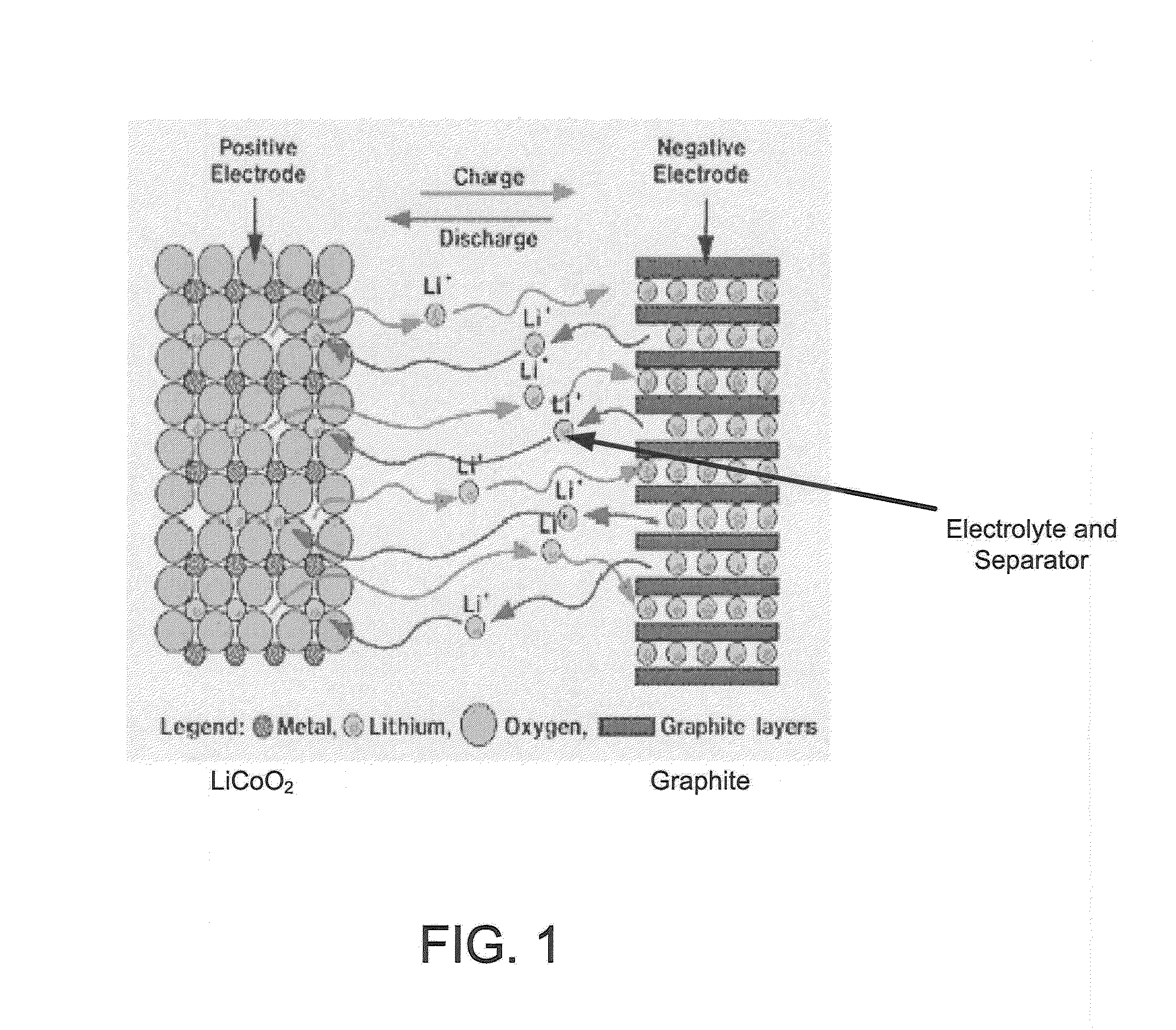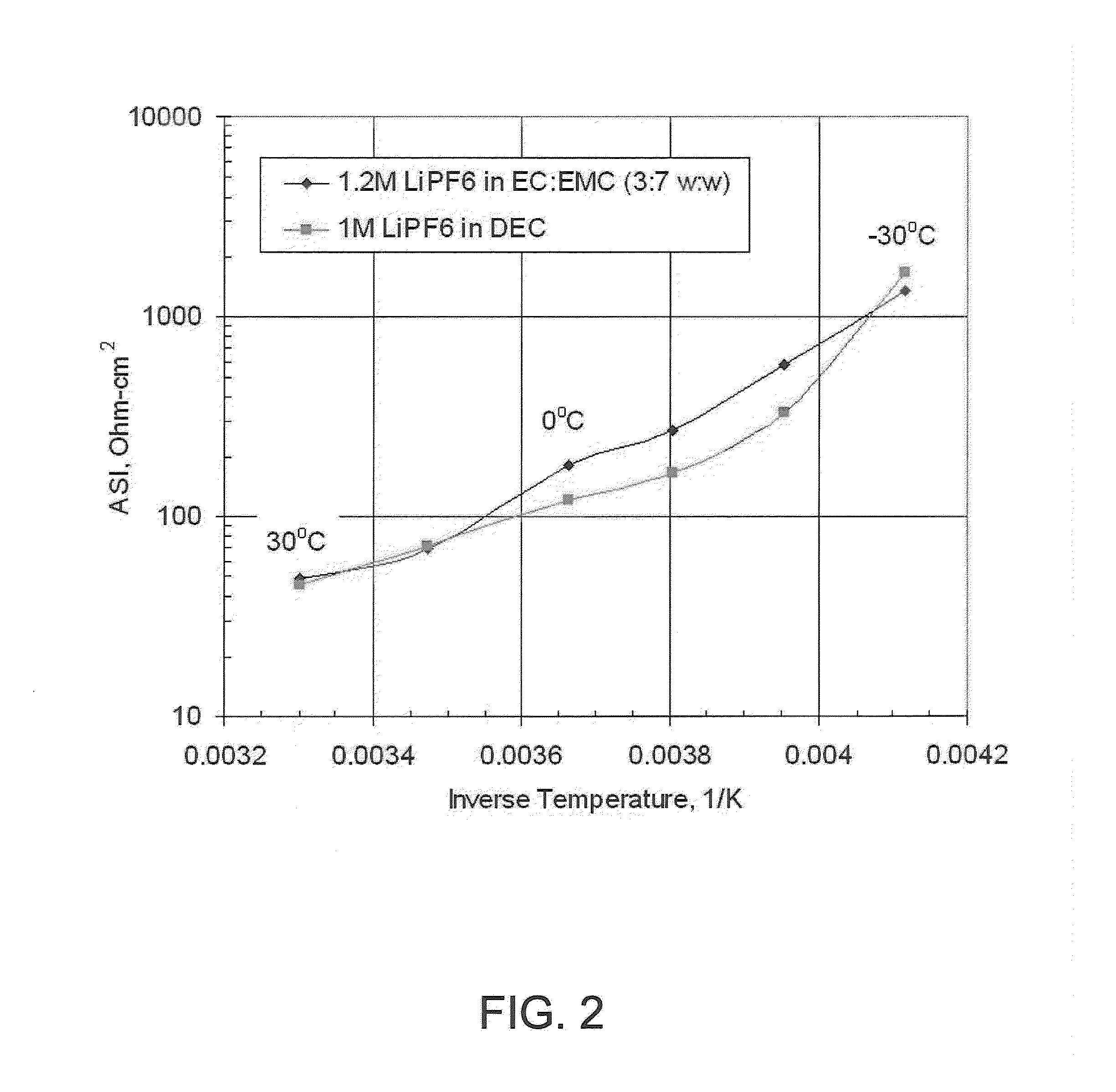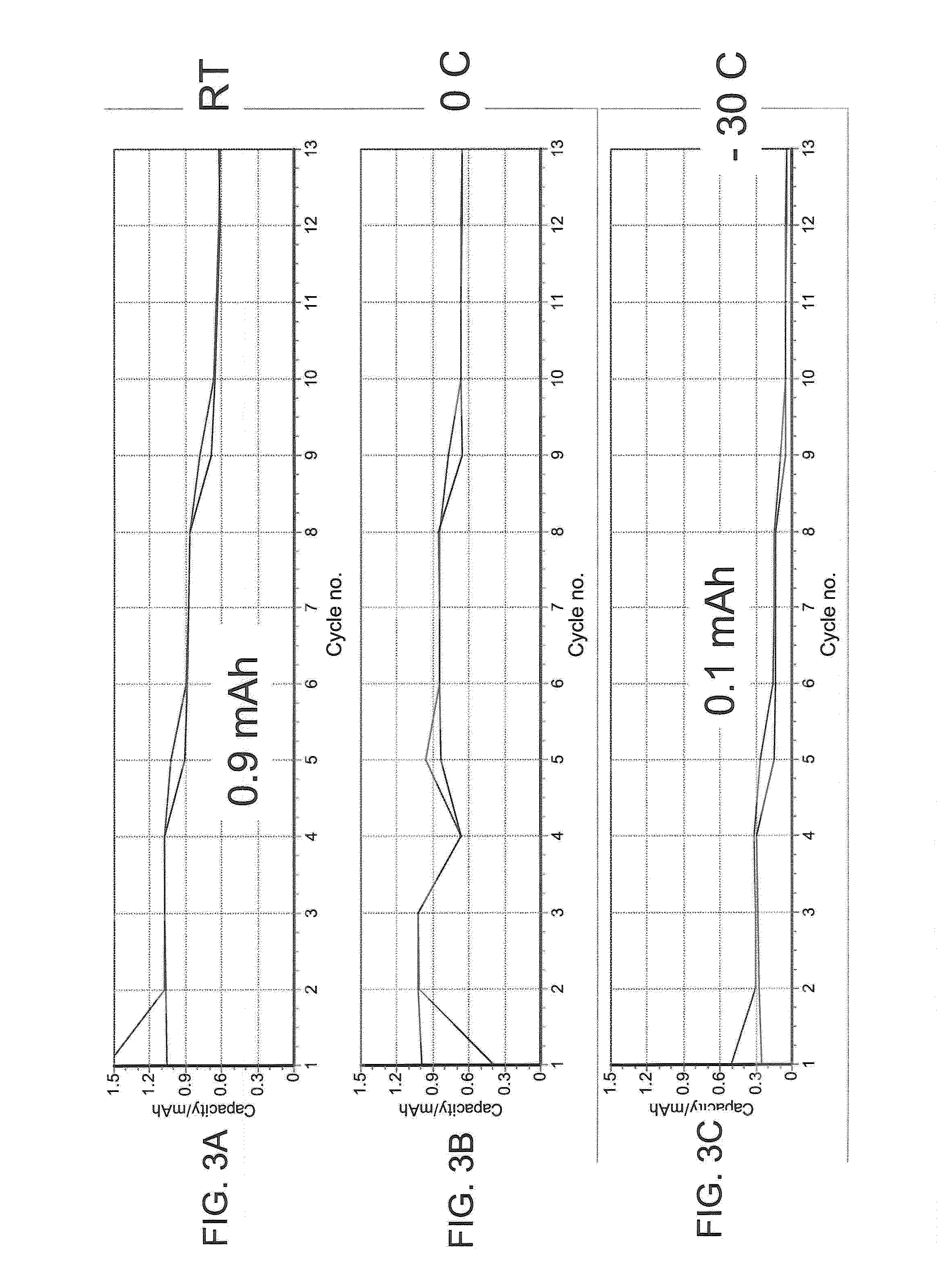Electrolytes for lithium ion batteries
a lithium ion battery and electrolyte technology, applied in the field of lithium ion batteries, can solve the problems of limiting the overall performance factor, low temperature, and the chemistry of the battery presently used cannot meet the requirements below 0° c, and achieve the effects of improving power performance, improving performance, and improving operation ability
Active Publication Date: 2014-08-05
UCHICAGO ARGONNE LLC
View PDF4 Cites 0 Cited by
- Summary
- Abstract
- Description
- Claims
- Application Information
AI Technical Summary
Benefits of technology
The invention identifies a new type of lithium-ion battery electrolyte that uses a ketone-based solvent. This solvent has advantages over existing electrolytes as it is cost-effective, performs well at low temperatures, and can be used at low pH levels. The researchers have discovered several new non-Lewis Acid salts that are stable in ketone-based solvents, which can form stable electrolytes with the preferred lithium titanate electrode. The researchers also found that adding certain additives to the ketone solvent improved stability and performance. The resulting electrolyte performed well against a graphite anode.
Problems solved by technology
For example, a key issue for HEV and, in particular, PHEV is the development of batteries which operate at lower temperatures since a large fraction of vehicles and power sources in the US must be able to function at temperatures in the range of 0° C. and less.
Tests have shown that the battery chemistry presently used cannot meet requirements below 0° C., a relatively common winter temperature for the northern half of the U.S. The cause of this problem is not known at this time.
However, as with other systems, it has the same low temperature issues.
For many battery systems the limiting factor in overall performance is the ability of the electrolyte to conduct lithium ions and have stability over the appropriate electrochemical window.
Evidence suggests that a limiting factor in improving battery power and improving low temperature performance is the carbonate-based electrolytes presently used, which are optimized for room temperature operation, while low temperatures typically require special additives.
In the next generation of hybrid electric vehicle (HEV), battery cost and power are key issues, in addition to the ability to function at a variety of temperatures, including low temperatures.
Method used
the structure of the environmentally friendly knitted fabric provided by the present invention; figure 2 Flow chart of the yarn wrapping machine for environmentally friendly knitted fabrics and storage devices; image 3 Is the parameter map of the yarn covering machine
View moreImage
Smart Image Click on the blue labels to locate them in the text.
Smart ImageViewing Examples
Examples
Experimental program
Comparison scheme
Effect test
example
[0025]An experiment was performed to understand the behavior of Li as a function of temperature. A set of VT7Li NMR studies were performed on electrolytes. The Li line widths were determined as a function of temperature wherein line widths correspond to the degree of stability of the solvent sphere around the Li and to some extent its ‘weight.’FIG. 8 illustrates the results.
the structure of the environmentally friendly knitted fabric provided by the present invention; figure 2 Flow chart of the yarn wrapping machine for environmentally friendly knitted fabrics and storage devices; image 3 Is the parameter map of the yarn covering machine
Login to View More PUM
| Property | Measurement | Unit |
|---|---|---|
| temperatures | aaaaa | aaaaa |
| temperature | aaaaa | aaaaa |
| temperatures | aaaaa | aaaaa |
Login to View More
Abstract
A family of electrolytes for use in a lithium ion battery. The genus of electrolytes includes ketone-based solvents, such as, 2,4-dimethyl-3-pentanone; 3,3-dimethyl 2-butanone(pinacolone) and 2-butanone. These solvents can be used in combination with non-Lewis Acid salts, such as Li2[B12F12] and LiBOB.
Description
[0001]The United States Government has certain rights in this invention pursuant to Contract No. DE-AC02-06CH11357 between the U.S. Department of Energy and University of Chicago Argonne, LLC representing Argonne National Laboratory.CROSS-REFERENCE TO RELATED PATENT APPLICATIONS[0002]This application claims the benefit under 35 USC 119(e) of U.S. Provisional Application No. 61 / 079,727, filed Jul. 10, 2008 and is incorporated herein by reference in its entirety.FIELD OF THE INVENTION[0003]The present invention relates generally to the field of lithium ion batteries. More particularly, the invention relates to electrolytes for lithium ion batteries, such as for example, ketone-based solvents.BACKGROUND OF THE INVENTION[0004]There is currently enormous pressure to develop alternative power sources for vehicles (and other systems needing a portable energy source) to reduce US national dependence on petroleum products as an energy source. The US government and industry has identified hyb...
Claims
the structure of the environmentally friendly knitted fabric provided by the present invention; figure 2 Flow chart of the yarn wrapping machine for environmentally friendly knitted fabrics and storage devices; image 3 Is the parameter map of the yarn covering machine
Login to View More Application Information
Patent Timeline
 Login to View More
Login to View More Patent Type & Authority Patents(United States)
IPC IPC(8): H01M6/16
CPCH01M10/0569H01M10/0525H01M10/0568H01M2300/0025Y02E60/122Y02E60/10
Inventor VAUGHEY, JOHNJANSEN, ANDREW N.DEES, DENNIS W.
Owner UCHICAGO ARGONNE LLC
Features
- R&D
- Intellectual Property
- Life Sciences
- Materials
- Tech Scout
Why Patsnap Eureka
- Unparalleled Data Quality
- Higher Quality Content
- 60% Fewer Hallucinations
Social media
Patsnap Eureka Blog
Learn More Browse by: Latest US Patents, China's latest patents, Technical Efficacy Thesaurus, Application Domain, Technology Topic, Popular Technical Reports.
© 2025 PatSnap. All rights reserved.Legal|Privacy policy|Modern Slavery Act Transparency Statement|Sitemap|About US| Contact US: help@patsnap.com



